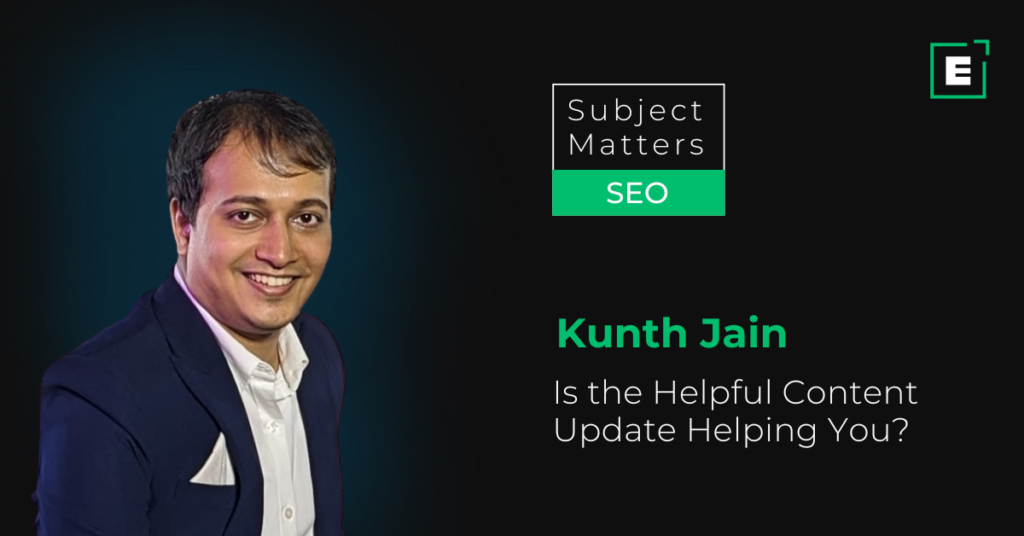How to Survive Google’s Helpful Content Update (and Grow)

“The best advice is to continue building your site while acting like Google doesn’t exist,” and this sentiment is echoed by SEO experts across the internet as well as trending on Reddit. Though, most surprisingly, after its recent core algorithm update, Google too is advocating the same sentiment when they say, “We recommend that you focus on creating people-first content to be successful with Google Search, rather than search engine-first content”. But didn’t most writers already do that before being prompted by their SEO colleagues to add three more keywords and 17 more bullet points? Well, the search giant has flipped the script, and its a time of reckoning for content creators. It has come up with a new Helpful Content Update (HCU) to disrupt how people find answers online.
Why Did Google Need to do a Helpful Content Update?
Why did Google feel the need to shake things up with this core algorithm update? Did you think it’s because of ChatGPT? Well, the answer is yes and no.
OpenAI and ChatGPT did create disruption, but if one takes a really close look at the numbers, Gartner’s prediction that search traffic volume would fall 25% by 2026 seems extremely far-fetched. It has been 1.5 years since the launch of ChatGPT, but Google’s share of the search market (Google, Bing, Yahoo, OpenAI) shifted from 91.5% in Jan-23 to 90.7% in December 2023. In the meantime, OpenAI’s share had bumped to 3.1% on April 2023 but fell back again to 1.1-1.4% by the end of the year.
So, it doesn’t seem like people are abandoning Google search. But yes, many website owners are increasingly using AI bots (like ChatGPT) to create content at scale. The content quality was tacky to the human eye, but it was still good enough to manipulate Google bots into ranking such pages on top.
Even as bots couldn’t, most people started to realize that. So, guess what happens when an average internet searcher doesn’t find a helpful answer after checking two to three results on Google?
They start looking for a different solution. And as history tells us, people always find alternative solutions to fulfill their Jobs To Be Done. And Google understands this.
They were the ones who disrupted Yahoo’s search monopoly in the early 2000s. With ChatGPT foraying into the scene, the executives at Google figured that if they didn’t improve their search results fast enough, Google, too, would be ditched. The quality of search results had already been dwindling; with the arrival of AI-generated content, it had fallen even faster.
What is the Helpful Content Update?
Google’s Helpful Content Update is, as it sounds, a cry for help in an attempt to make their algorithm AI-manipulation proof. Whether this attempt succeeds or not is yet to be seen.

The HCU has been Google’s largest-ever core algorithm update. It began rolling out on the 5th of March 2024 and concluded on the 19th April 2024.
HCU was also accompanied by several new and harsh spam policies put in place by Google.
While the initial projections by Google aimed to remove 40% of spam from its search results, they now claim that the update ended up removing ~45% of low-quality, unoriginal content in search results.
There is no way any individual can measure the validity of that claim. Across online forums and small sample researches, people have raised many doubts about the efficacy of HCU.
Though in all probability, the Helpful Content Update is here to stay. All an online business can do is fine-tune its own digital growth strategy.
Early Trends and a Few Big Changes of the HCU
A tingling feeling for most SEO experts has been an increased number of results from large websites/brands and online UGC forums (Reddit and Quora). This might have something to do with Google’s new way of figuring out what’s helpful for searchers.
Though Reddit seems to have made the most out of it, as its SEO has tripled in the last few months, other estimates say it has grown 10x. Not many independent bloggers are happy with this development.
With the overall enhancements in how AI ‘understands’ content, the Search team at Google has now begun downplaying the impact of backlinks. While the initial Google algorithm depended heavily on high-quality backlinks, it’s no longer considered even amongst the top three factors, as per Google’s Gary Illyes.
Domain-level signals are real! Google has long claimed that rankings are primarily dictated by the content on the page and not domain-level performance. However, with the latest spam policies, Google is acknowledging domain-level penalties.
Helpful Questions to Ask About the Helpful Content Update
Google’s systems may be far from perfect. Using advanced AI in their own core algorithms, they have improved comprehension of website content, but it’s still evolving. There will be more updates soon.
In the meantime, they have published some frameworks and questions to help website owners figure out what kind of content they should produce.
It’s good to see that even after HCU, Google’s algorithm still values the experience, expertise, authoritativeness, and trustworthiness (E-E-A-T) framework. What’s different is that they are upfront about placing Trust as the prime factor among these four.
But trust is one of the most difficult (if not impossible) to measure traits, right? Clearly, Google realizes this, and thus, it keeps highlighting that its algorithm will keep evolving.
However, to help website owners, they have shared a list of questions that can help determine whether their content strategy is headed in the same direction as Google’s.
What to Expect in the Near Future
Templatized strategies never work (at least not for long). With HCU, templatized content creation, too, has stopped working. Most SEO experts are holding their breath. And sometimes, that’s a good thing.
It’s uncertain in which direction this will go when the dust settles. The update is too new; there is little data, and many experiments still need to be tested. The old adage stands true that good SEO takes time. Though just between you and me, it has never been about Google.
There are many other ways to reach your prospective audience. And if you are looking for alternatives, the bullseye framework might be a great starting point.
The truth is that, Google or not, people will always keep searching for answers. And there will be others who will try to answer them if you have a deep understanding of the question and a reasonably helpful answer. Eventually, you should be able to get the right audience (and hopefully some paying customers).
Now, if you will excuse me, I need to keep continuing my search for the meaning of life…
NOTE: The views expressed in this article are those of the author and not of Emeritus.






